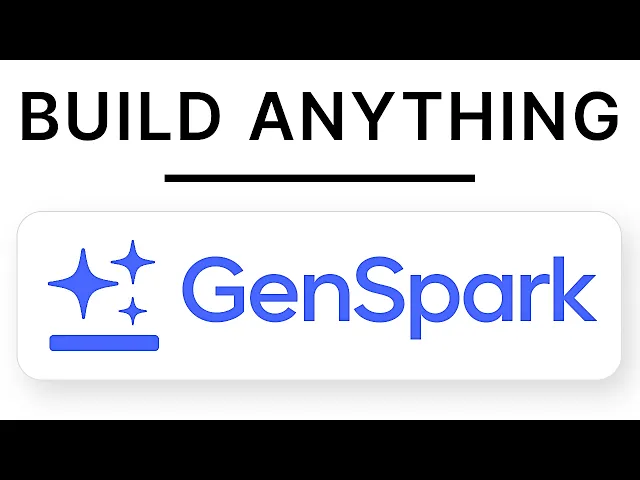GenSpark: NEW AI Super Agent Update is INSANE 🤯

New GenSpark super agent changes the game
In a digital landscape constantly reshaped by artificial intelligence innovations, few developments arrive with the potential to fundamentally transform our relationship with technology. The latest update to GenSpark's AI super agent represents precisely such a watershed moment, combining advancements in agent architecture with unprecedented multimodal capabilities. This evolution signals a significant leap forward in AI's ability to serve as a genuine assistant rather than merely a sophisticated query processor.
Key developments in the GenSpark update
-
Architectural improvements enable the agent to maintain context and execute complex multi-step reasoning across different modalities including text, images, and potentially code generation
-
Enhanced reasoning capabilities allow the system to break down complex problems into manageable components before synthesizing comprehensive solutions
-
Improved multimodal integration permits seamless interaction between visual input processing and textual reasoning, creating a more cohesive user experience
The most compelling aspect of GenSpark's update lies in its fundamental reshaping of AI agent architecture. Rather than following the traditional approach of providing direct responses to queries, GenSpark has embraced a more sophisticated framework that prioritizes deep contextual understanding and multi-step reasoning. This architectural shift enables the AI to address complex challenges by breaking them down methodically, considering various perspectives, and crafting solutions that demonstrate a previously unattainable level of nuance and depth.
What makes this particularly significant is how it addresses one of the most persistent criticisms of generative AI systems: their tendency to produce plausible-sounding but often superficial or disconnected responses. By implementing stronger reasoning mechanisms, GenSpark has taken a substantial step toward AI systems that don't just mimic understanding but actually engage in genuinely productive problem-solving processes.
This advancement doesn't exist in isolation. It emerges within an industry landscape increasingly focused on agent-based approaches to AI. Companies from Anthropic to Google DeepMind have signaled their belief that agent architectures—systems capable of setting their own sub-goals and maintaining extended context—represent the next frontier in AI capabilities. GenSpark's implementation suggests we've reached an inflection point where these theoretical advantages are beginning to deliver tangible benefits to end users.
For business leaders, the implications extend far beyond incremental productivity gains. The ability to delegate complex, multi-step tasks to an AI system
Recent Videos
How To Earn MONEY With Images (No Bullsh*t)
Smart earnings from your image collection In today's digital economy, passive income streams have become increasingly accessible to creators with various skill sets. A recent YouTube video cuts through the hype to explore legitimate ways photographers, designers, and even casual smartphone users can monetize their image collections. The strategies outlined don't rely on unrealistic promises or complicated schemes—instead, they focus on established marketplaces with proven revenue potential for image creators. Key Points Stock photography platforms like Shutterstock, Adobe Stock, and Getty Images remain viable income sources when you understand their specific requirements and optimize your submissions accordingly. Specialized marketplaces focusing...
Oct 3, 2025New SHAPE SHIFTING AI Robot Is Freaking People Out
Liquid robots will change everything In the quiet labs of Carnegie Mellon University, scientists have created something that feels plucked from science fiction—a magnetic slime robot that can transform between liquid and solid states, slipping through tight spaces before reassembling on the other side. This technology, showcased in a recent YouTube video, represents a significant leap beyond traditional robotics into a realm where machines mimic not just animal movements, but their fundamental physical properties. While the internet might be buzzing with dystopian concerns about "shape-shifting terminators," the reality offers far more promising applications that could revolutionize medicine, rescue operations, and...
Oct 3, 2025How To Do Homeless AI Tiktok Trend (Tiktok Homeless AI Tutorial)
AI homeless trend raises ethical concerns In an era where social media trends evolve faster than we can comprehend them, TikTok's "homeless AI" trend has sparked both creative engagement and serious ethical questions. The trend, which involves using AI to transform ordinary photos into images depicting homelessness, has rapidly gained traction across the platform, with creators eagerly jumping on board to showcase their digital transformations. While the technical process is relatively straightforward, the implications of digitally "becoming homeless" for entertainment deserve careful consideration. The video tutorial provides a step-by-step guide on creating these AI-generated images, explaining how users can transform...
